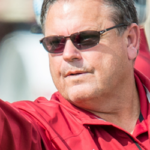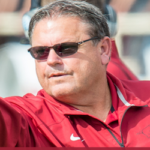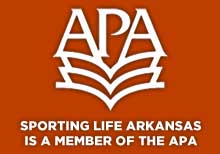By Sara Dacus
On Monday, August 18, I, an eighth grade English teacher in Searcy, Ark., will compete in the NASCAR/Frogger hybrid of the first-day-of-school traffic. When my son’s daycare opens at 7:30, I’ll run in the race to drop-off children that one dad – when the metaphor was in season – compared to the Kentucky Derby. Upon arriving at the junior high, “Chariots of Fire” will play in my head as I sprint across the parking lot to make the 7:40 sign-in time in the office.
When my first period class enters my room, I will channel a coach giving an inspirational halftime talk. “Now that you are in eighth grade, you are on the cusp of adulthood. Next year, in high school, you will be playing the game for real. Every daily grade will count toward your cumulative GPA. Your cumulative GPA will be a factor in college acceptance and scholarship awards. Every daily grade brings you one small step closer to your dream career. You need to establish good habits now if you don’t already have them. The decisions and habits you make today will affect you for the rest of your life.”
This will resonate with a few students. Others ponder instead if the chicken rings on the lunch menu are tasty, if they will have friends in their later classes, if they look good enough to catch the eye of the hot student, if the football starters are set for the first game.
Junior high is a strange twilight zone. I’m sure you remember and wouldn’t want to return. We have such disparity in our hallways (sometimes in the hallways I feel as if I am wearing the black and white stripes of a referee. On rare occasions, an issue of full pads would be welcomed). Some students look like adults. Some look like they still belong in elementary. Likewise, some are more mature about their hopes and dreams.
In connection with my first day of school pep talk, one of the first writing exercises will ask students to envision their lives in fifteen years: What career will you enjoy getting up and going to 40 hours a week, 50 weeks out of the year? What will bring you enjoyment and a sense of purpose in life? A shocking number of students will write about how, after four action-packed years playing sports at the University of Arkansas, they will be dominating with the St. Louis Cardinals, Oklahoma City Thunder or Dallas Cowboys. One small guy last year didn’t even know it was difficult to get in the NBA.
I will now be conflicted. In times past, I played the role of realist. Most of my students will turn fourteen during the school year. Many will take the driver’s test. It’s time to grow up. A group of seasoned coaches from our school could only recall five of our athletes going pro, and that includes a couple guys who never made it out of the minors (one of the most successful was Weston Dacus, a distant relative who played for the Kansas City Chiefs in 2008). Chances are our school probably won’t produce thirty pro athletes from one graduating class. In English, we discuss other athletic-related careers for sports lovers: marketing manager, statistician, journalist, coach, physical therapist, agent, event coordinator, scout.
However, my dream-crushing perspective has changed slightly. I was venting to a friend about my overabundance of students with professional athlete dreams, and she said, “Well, it’s better than pushing drugs on the street.” Boom. She was so right. Obviously, athletics encourage both the privileged students and those with fewer advantages to show up for school. If athletic dreams are keeping students on the straight-and-narrow and maybe even helping with academic performance, perhaps I shouldn’t quell these hopes just yet.
And the emphasis on sports is everywhere. On the state level, Bret Bielema is the highest-paid employee from any Arkansas agency. On the local level, our school board held its June meeting on a Wednesday night. Thursday’s local paper reported on the assistant football coaches who were hired. Friday’s paper introduced my school’s new assistant principal. In the microcosm that is my home, my son’s second word was “ball.”
My students’ writing also reflects diverse experiences, from naive to too-knowledgeable-too soon. I read essays written by girls whose biggest moments were attending a Justin Bieber concert and boys whose dogs are the center of all. And I’ve read a few essays that reveal dangerous relationships and tendencies to self-harm (that are immediately taken to the counselor. And sometimes she and I involve a coach). But a recurring essay theme is the sense of belonging and accomplishment provided by athletics. The girl who is beyond excited to be on the volleyball team. The player whose proudest moment is scoring the winning touchdown. A description of the final game of the Little League World series. The basketball coach who has made a remarkable difference in a student’s life. A description of playing rivals and winning. Extracurricular activities mold our students in powerful ways.
So I’ve tried to harness the power of the athletics. Last year, for a unit we call “Reading and Writing in the Real World,” I invited a football coach who helped recruit Harding Bison to come speak. He emphasized the importance of academics, stating that colleges are looking for team members who will succeed in the classroom all four years. The coaches don’t want to squander scholarships on players who will not be around senior year to contribute to the team. He also discussed that athletes who are more polished communicators can distinguish themselves and their applications.
I share a group of students with a math teacher, science teacher and social studies teacher. Half of our team double as coaches. When we have a student who is not performing to his or her potential, we call the student in for a group conference. The coaches give the athletes a special set of messages: “If you don’t make grades, you won’t get to play.” “Would you act like that in practice for one of your coaches?” “Your coaches help you prepare for a game; Your teachers help you prepare for life.” It is powerful to watch the positive influence that the coaches can have on their players.
So let’s have a pep rally for a new football, basketball, baseball, golf, wrestling, volleyball, bowling, tennis, soccer and track season. And let’s have a pep rally for new classes, fresh pencils, first-time encounters with literature and clean composition notebooks. To paraphrase a fellow English teacher, in our dream world, each class period would end with all students standing on their desks, saying “O Captain! My Captain!” In reality, we will be happy if our students leave with a slightly increased appreciation for the power of reading and writing. And since athletics can help us reach these academic goals, we will gladly hold hands with sports.















